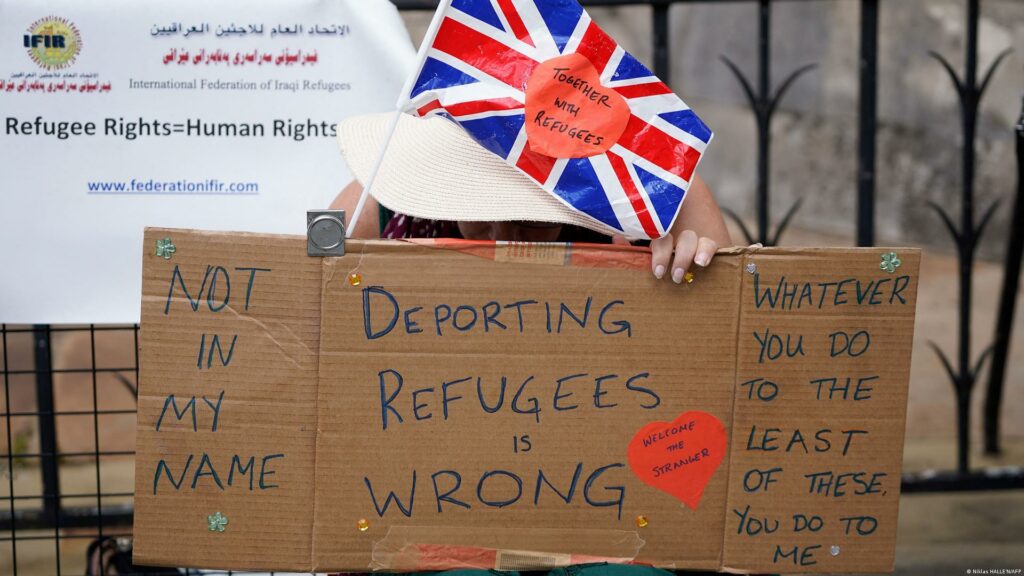Brits Deporting Migrants to Rwanda
A legal but unsavory solution to a problem.

AP (“Court: UK plan to send asylum-seekers to Rwanda is legal“):
The U.K. government’s plan to send asylum-seekers on a one-way trip to Rwanda is legal, two High Court judges ruled Monday in a victory for backers of the controversial policy.
But the judges also said the government failed to consider the individual circumstances of the people it tried to deport, signaling further legal battles ahead before anyone is put on a plane to East Africa.
A court hearing in the case is set for next month, and appeals are likely.
Several asylum-seekers, aid groups and a border officials’ union filed lawsuits to stop the Conservative government acting on a deportation agreement with Rwanda that aims to deter migrants from trying to reach the U.K. by crossing the English Channel.
The U.K. plans to send some migrants who arrive in the U.K. as stowaways or in small boats to the East African country, where their asylum claims would be processed. Under the plan, applicants granted asylum would stay in Rwanda rather than returning to the U.K.
“The court has concluded that it is lawful for the government to make arrangements for relocating asylum-seekers to Rwanda and for their asylum claims to be determined in Rwanda rather than in the United Kingdom,” Judge Clive Lewis said.
But he added that the government “must decide if there is anything about each person’s particular circumstances which means that his asylum claim should be determined in the United Kingdom or whether there are other reasons why he should not be relocated to Rwanda.”
“The Home Secretary has not properly considered the circumstances of the eight individual claimants whose cases we have considered,” the judge said.
It’s not clear from the reporting where these people are coming from or what they’re fleeing. But, even aside from the legality and humanity of the situation, flying them to Rwanda strikes me as an incredibly inefficient means of processing claims.
Ever Solomon, head of the charity Refugee Council, said the group was “very disappointed” by the ruling.
“Treating people who are in search of safety like human cargo and shipping them off to another country is a cruel policy that will cause great human suffering,” he said.
More than 44,000 people who crossed the Channel in small boats have arrived in Britain this year, and several have died in the attempt, including four last week when a boat capsized in freezing weather.
Human rights groups say the government’s deal with Rwanda is illegal and unworkable, and that it is inhumane to send people thousands of miles to a country they don’t want to live in. They also cite Rwanda’s poor human rights record, including allegations of torture and killings of government opponents.
There is no right to choose what country you migrate to. The UK, like every other country, has the right to control its borders and maintain an immigration policy.
Contrary to popular belief, qualifying for asylum requires more than demonstrating that the place you’re fleeing is a hellhole. One must prove “persecution or a well-founded fear of persecution on account of race, religion, nationality, membership in a particular social group, or political opinion.” By custom, although not by law, asylum should be sought in the first safe country on the route out. One has to bypass a whole lot of other countries to get to the UK unless they’re fleeing Ireland or France.
Britain has paid Rwanda 120 million pounds ($146 million) under the deal struck in April, but no one has yet been sent to the country. The U.K. was forced to cancel the first deportation flight at the last minute in June after the European Court of Human Rights ruled the plan carried “a real risk of irreversible harm.”
The British government is determined to press on with the policy, arguing that it will deter people-trafficking gangs who ferry migrants on hazardous journeys across the Channel’s busy shipping lanes.
Home Secretary Suella Braverman, who has called the Channel crossings an “invasion of our southern coast,” told the Times of London it would be “unforgivable” if the government did not stop the journeys.
From a US standpoint, the notion that 44,000 would-be asylum seekers is to big a burden to manage seems quaint. We’ve had more than 2 million in the past year. But we share a massive border with the developing world and the UK is an island surrounded by some of the richest countries on the planet.
The U.K. receives fewer asylum-seekers than many European nations, including Germany, France and Italy, but thousands of migrants from around the world travel to northern France each year in hopes of crossing the Channel. Some want to reach the U.K. because they have friends or family there, others because they speak English or because it’s perceived to be easy to find work.
The government wants to deport all migrants who arrive by unauthorized routes, and aims to strike Rwanda-style deals with other countries. Critics point out there are few authorized routes for seeking asylum in the U.K., other than those set up for people from Ukraine, Afghanistan and Hong Kong.
A surge in arrivals and a U.K. bureaucratic backlog, exacerbated by the coronavirus pandemic, has led to many Channel migrants languishing in overcrowded processing centers, where there have been outbreaks of diphtheria and other diseases.
This is a classic Catch-22: the UK will only accept those who arrive via authorized routes but they have authorized essentially no routes.






This also speaks to Venezuelan refugees walking thousands of miles through a half dozen countries to present their asylum claims in Texas. They have successfully entered and left Colombia, Panama, Costa Rica, Nicaragua, El Salvador/Honduras, Guatemala/Belize and Mexico.
This is a defeat for the government wrapped up in conciliatory way by the High Court.
The point of the government’s plan was to find a means of automatic and immediate deportation for all arrivals by unauthorised means, in order to collapse the organised crossing business.
If each person’s case must be reviewed first, the whole thing is pointless.
Because it is highly unlikely the courts will then permit an argument of “unauthorised entry voids asylum” across the board. Especially given the dubious record of Rwanda.
Which got picked because no other country was willing to be bribed to take on the job.
The really annoying thing is the problems in the asylum system stem primarily from two sources.
Firstly, the appalling backlog of cases awaiting processing, now around 150k.
Which successive Home Secretaries and especially Patel and Braverman have failed to tackle because they are busy wasting time and money on the Rwanda scheme.
Secondly, the UK withdrawal from the Dublin III Regulation.
This allows EU countries to return asylum seekers to the first country they arrived at.
Thus removing the incentive for some frontier countries (*waves at Greece*) to let refugees in and just pass the parcel.
But also requiring “burden sharing” for settlement and finance for those granted asylum.
It appears that the EU was willing to negotiate a continuation as part of the Withdrawal Agreement, but the government just swanned along under the delusion that it could impose its preference; and a short term refusal to compomise played well with the stroppier, and stupider, Tories.
It’s probably difficult to mitigate this in the short tem, but one sensible policy would be to arrange pre-processing in eg France of applicants, enabling those with prima facie claims (eg Afghans, Syrians, Belorussians) to be granted asylum and transferred .
Ukrainians and Hong Kong Chinese already have such schemes; though they don’t work very well, given H.O. incompetence
Which would probably make the French more willing to enforce against the people smuggling operations, and to themselves deport those without valid claims.
And it is obvious a good number of claims are invalid, given that recent reports had some 20% of Channel-crossers identified as Albanians.
Albania being a country that is actually in Europe, unplagued by warfare or civil strife, a member of NATO, on track for EU accession, and with minimal historic links to the UK.
It is also fair to say that Rwanda is not a legitimate choice. It is a country that within the past generation employed genocide to “handle” ethnic tensions.
As ever, the unspoken assumption is what is so sad, and reflects so poorly on the British Conservative Party (and their American counterparts)
The assumption that refugees are some onerous burden, a vexing problem in need of solution, instead of a blessing and a solution to a problem.
@JohnSF: It is worth mentioning that the entire UK process for entry as like visas is now a shambolic catastrophe with massive delays. I am trying to get a PE colleauge visa as we have meetings in London and video conference for closing equity on final nego is not ideal… it’s six months of idiotic round-and-round with developing world levels of gross incompetence, and we still don’t know. God help ordinary people.
@MarkedMan: That is a profoundly ridiculous comment. The current Government is the one that stopped the genocide. It’s a vile piece of smear by association (like smearing Germany on asylum now for its nazi past).
There are very legitimate reasons to criticise the UK gov on Rwanda gov and this (of which Kagame’s own authoritarian bent on punishing political dissent) but smearing the country as a destination over that history is ingnoramus bollocks.
I just realized that the people that the Brits are planning to send to Rwanda are not necessarily from Rwanda. Rwanda is just the place that took the money to hold the folks. Legal? I would call that legalistic and potentially quite wrong. Shipping people to Auschwitz was legal under the laws of the existing government.
I’ll admit to having a soft spot for refugees. They are human beings. We should not be unkind to them. https://reformjudaism.org/learning/torah-study/torah-commentary/judge-society-its-hospitality
@Slugger: Pending actual information, there does not appear to be any agenda on the part of Rwandan government to liquidate refugees or run death camps so one can put aside death camp analogies.
It’s a ridiculous policy and ridiculous to send political refugees to an increasingly authoritarian country which has used its courts against political opponents. That’s quite enough of a basis to critique without death camp allusions.
What Kagame is thinking is a bit of a mystery but he may be conceptualising this economically given his economic development agenda for Rwanda perhaps drawing on ideas that in the West Refugrees turn out to be oddly economically prodcutive. A strange demarche if so but not entirely out of keeping with his method.
@Lounsbury: I intended to highlight the problems of calling actions “legal” that strike me as contrary to a human ethos. I don’t think that the current government is planning mass exterminations.
In 1990 the population of Rwanda was 7.3 million. In 1995 it was 5.8 million.